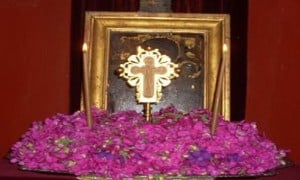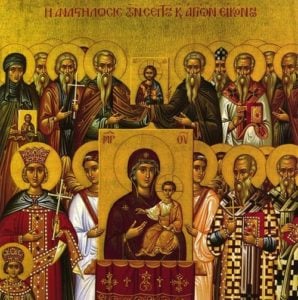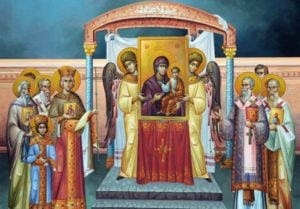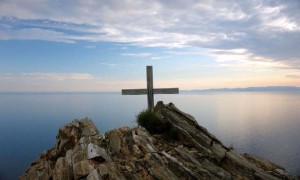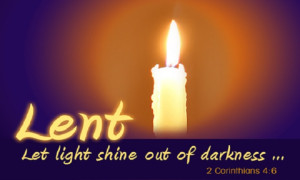Designation of Orthodoxy and Heresy – St Gregory Palamas [II]
2 April 2013The second Sunday in Great Lent comes as an extension of the Sunday of Orthodoxy. On this day, the Church celebrates victory over another form of heresy, a heresy which called into question the salvation of humankind on a second level: that of the way in which we make it our own. And the leader of the Church in the struggle against this heresy was Gregory Palamas, Archbishop of Thessaloniki.
Saint Gregory Palamas was born in 1296. He had God-fearing, well-to-do parents. At the age of seven, Gregory lost his father and the emperor himself undertook the supervision of his studies, which destined him for high public office. At the same time, however, he was already familiar with the ascetic life from within the context of his own home and was initiated into the Jesus Prayer by Theoliptos, another monk who later became Metropolitan of Filadelfia. But whereas the emperor was training him for high office, Gregory himself preferred the monastic life.
In the autumn of 1316, at the age of twenty, he set out for the Holy Mountain with his two younger brothers, Makarios and Theodosios. For the first three years of his stay there, he lived under the spiritual guidance of an ascetic called Nikodimos, at the border of the lands of the Holy Monastery of Vatoipaidi. After Nikodimos’ death, he moved to the coenobium of the Great Lavra and thereafter retired to a hermitage.
In 1325, raids by the Turks forced Palamas, as well as other Athonites, to flee the Holy Mountain. He went to a hermitage in the Skete of Veria, where he lived for about five years in strictest asceticism. In 1331, raids by Serbs forced him to abandon the Veria region and he returned to the Holy Mountain, where he continued to live as an anchorite in the hermitage of saint Savvas. It was here that he learned of the notions of Barlaam, a theologian and philosopher from Calabria in Southern Italy.
Barlaam was Orthodox and accepted all the dogmas of the Church which had been formulated by the seven Ecumenical Synods. So he didn’t present any heretical views on the first of the two levels we mentioned [in part 1], but he did on the second: on the manner in which we as people relate to God’s salvation. Barlaam didn’t say that Christ or the Holy Spirit were created, as did the Arians and Pnevmatomakhi (“Contenders against the Holy Spirit”), but he did claim that the energy of God, that is His grace, with which humankind is saved, is created. But this would mean, again, that people don’t come into a direct, personal relationship with God and aren’t united with Him, but with some creation of His. And, as regards our salvation, this claim was no different from that which the Arians and Pneumatomachi promulgated.
Our salvation is an ontological event. That is to say that it’s an event which covers the whole of a person’s existence and is brought about through direct, personal communion and union with God. It’s the transfer of the divine life which we lost with the apostasy of Adam and Eve. People aren’t saved by learning particular truths or acquiring certain theoretical knowledge about God. And God doesn’t save people by providing information about Himself, but by coming to them as a human person, though without ceasing to be God. He saves them with His life and death, with His Cross and Resurrection.
The whole mystery of God’s dispensation concerning our salvation was summed up by Saint Paul in one sentence: “Great is the mystery of Godliness; He appeared in the flesh, was vindicated in the Spirit, seen by angels, preached among the nations, believed in by the world and was taken up in glory”. This mystery is experienced in the spiritual locus of the Church. In essence, this mystery is identical to that of the Church. This is why the Church, which performs the mystery of our communion and union with God, is described by Saint Gregory Palamas as “a communion of deification”.
A communion of deification means a communion which prepares and produces gods, gods by grace. This was, in any case, God’s pre-eternal plan for us humans, as is indicated by the phrase “in the likeness”: people were to become gods, participating in the grace of the Triune God. But the implementation of God’s plan requires our consent and co-operation. God endowed us with freedom and He imposes nothing through force. This is why the aim which God set for us is implemented only through our independent co-operation. And since the human race became corrupt after our apostasy from God, we have to work to find our true selves again, by God’s grace, and to progress towards the goal which God has set for us. The Church calls each of us to engage in this struggle, particularly now, at the time of Great Lent.
Saint Gregory was just the man to bring this struggle to a successful conclusion. This great theologian of the Church teaches us, above all, how important it is for people to find their real selves again, to direct their paths towards God and to make their own the great gift of salvation which God offers. He teaches us how important it is for people to turn in on themselves, to bring their sundered intellect into their hearts and to listen to the invitation Christ makes to them: “Behold, I stand at the door and knock. If anyone hears my voice and opens the door, I will come in and eat with that person, and they with me”. These truths and this way of life are what Saint Gregory defended against Barlaam. These truths and this way of life are what Barlaam, and those who thought like him, cast doubt on and fought against.
We might say that with Barlaam’s teaching we don’t have a simple heresy but rather the complete overturning and demolition of the gift of divine dispensation. To use the words of Saint Symeon the New Theologian concerning an analogous phenomenon in his own time, it was a doctrine which “overturns the whole of the dispensation of our God and Saviour Jesus Christ and clearly rejects the restoration of the damaged image”.
Saint Gregory Palamas defended the authentic tradition of the Church, which had been the same from the beginning, in the East and West. He fought for the removal of the deviations which had led to the schism. He fought the teaching of Barlaam that the energy of God is created, and stressed that, with His uncreated grace, God comes into personal communion with people, unites with them and deifies them. In this way he promoted genuine Christianity, gave his support to Orthodoxy and kept open the path for people to attain deification.
The disjunction between the Christian life and the Church which has occurred in recent years has distorted Christianity and favoured secularization. And since secularization first became established and firmly-rooted in the West, and then spread to the East as an imported feature, it’s obvious that the West would be dominant in this situation. This is why it’s natural for the secularized societies of the East to be in an inferior position compared to those of the West and to be led by the nose by them all the time into a variety of impasses. We’ve shown contempt for our authentic roots, rejected our spiritual riches, forgotten our transcendental orientation and have wanted to modernize, walking barefoot over the thorns of secularization.
At a critical point in history, Saint Gregory Palamas offered immense riches for the support of the Church and the Greek nation through his teaching and his life. Not only in his own time, but throughout the whole of the dark period of Turkish rule which followed. And even today, his personality and his teaching are a most valuable legacy, which we can use for our support and for our future course of action. For our course within history, for our dialogue with the Christian and non-Christian globalized world and for our fractured society.
In conclusion, I would like to make two remarks which are of special significance and relevance today. One is connected to the life of Saint Gregory Palamas and the other to his teaching.
When Palamas was consecrated Archbishop of Thessaloniki in Constantinople and left for Thessaloniki to take up his post, he was faced with the revolt of the Zealots, who prevented him from entering the city. Palamas withdrew peacefully to the Holy Mountain, where he led an ascetic life, as before, for about a year. Then the King of the Serbs, Stefan Dušan, who, because of the civil unrest and the revolt of the Zealots, had seized the opportunity to extend his authority over a significant part of Macedonia, visited the Holy Mountain and attempted to woo the archbishop, who was still excluded from his see, with flattering promises of political power, large jurisdictions and a plentiful supply of money. To these proposals the care-worn archbishop replied in the following noble manner:
“I have no need of powers, jurisdictions and ample funds. If you take a sponge that’ll soak up a chalice of water and throw it into the Aegean Sea, it’ll never absorb the vast sea, but will take from it only a chaliceful, which is it’s natural capacity, and leave the rest of that vast liquid mass untouched. I’m the same. From an early age I learned to live with little, it’s become second nature, and I’m satisfied with the basic necessities. So even if you offer me all the gold on earth and in the depths of the earth, even if you take me and throw me bodily into the streams of the mythical River Paktolos, I wouldn’t take anything more than my daily food and other requirements. So, talk of your many and great gifts and financial concessions neither moves nor interests me”.
The other point is connected, as we’ve said, to his teaching. As a “preacher of grace”, Saint Gregory stressed that the energy of God and His grace, through which people are saved, are not created. In other words, God doesn’t save people through some created feature which acts as an intermediary between Him and them, but Himself comes into direct, personal communion and union with them. In turn, people should approach God directly and personally. This is why prayer, which was at the centre of his dispute with Barlaam, is not merely the remembrance of God or the movement of the human intellect towards God, as Barlaam claimed, but personal communion and union with Him, and this culminates in Holy Communion.
Prayer means reference to a person. And people who really pray feel the presence of the Person to Whom their prayer is addressed. The Jesus Prayer (Lord Jesus Christ, have mercy upon me), in particular, which Palamas claimed should be continually on the lips of all believers, is his main recommendation and exhortation to people in our own time. Recommendation and exhortation for our restitution and the restoration of our communion with God and our fellow human beings.








